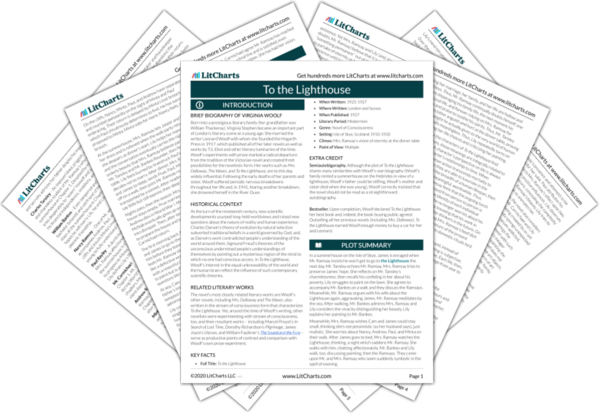Summary
Analysis
Cam races by Lily, Mr. Bankes, and Mr. Ramsay on the lawn and only stops after Mrs. Ramsay calls to her twice to send her to ask Mildred the cook if Andrew, Minta Doyle, and Paul Rayley have returned. Hearing back from Cam that they have still not, Mrs. Ramsay surmises that Paul must have proposed to Minta as she’s been hoping he would. She loves Minta and knows Paul is not very intelligent, but in her opinion “boobies” were vastly superior to “clever men who wrote dissertations.” All along, Mrs. Ramsay continues reading the story of the Fisherman and his Wife to James, in which the wife, frustrated that the Fisherman does not want to be king, announces she will become king herself.
Mrs. Ramsay is an eager matchmaker and makes matches based on her own understanding of happiness. Thus, she has set Minta up with a man that she herself would enjoy, without being certain that Minta will share her opinion. Mrs. Ramsay’s interior thought is mirrored by the story she reads in exterior life: by orchestrating the marriages of those around her, Mrs. Ramsay evinces some of the same desire for power expressed by the Fisherman’s wife.
Themes
Quiz
Test Yourself
Mrs. Ramsay tries and fails to remember if Nancy had gone along with Andrew, Minta, and Paul. She thinks that if Minta has refused Paul, she “would have to speak seriously” to her, for she couldn’t just keep going on walks with young men even if Nancy had indeed accompanied them. Mrs. Ramsay then thinks of Minta’s stuck-up, priggish parents (whom Mrs. Ramsay calls the Owl and the Poker) from whom she felt she had rescued the tomboyish, spirited Minta. But Mrs. Ramsay also recalls once being accused by a woman of “’robbing her of her daughter’s affections’” and thinks of being criticized for being bossy, interfering. She thinks these criticisms “most unjust” for she cannot help her own beauty and certainly does not pamper it. She thinks she is more “domineering” about “hospitals and drains and the dairy,” though she hardly has the time to do much about them.
From Mrs. Ramsay’s perspective, she has generously “rescued” Minta from an oppressive environment and given her space to be the sort of spirited woman Mrs. Ramsay admires. Yet, though she doesn’t want to believe them, Mrs. Ramsay knows that others might see this generosity as selfishness. as robbing Minta’s mother of her daughter’s admiration. Yet Mrs. Ramsay is able to push the threat of this other perspective aside and to restore her thoughts to the image of herself she prefers.
Themes
Quiz
Test Yourself
Mrs. Ramsay looks at James and wishes he and Cam could stay their age forever. She thinks of each of her children with love, and feels she would not care what people said about her as long as she was carrying a child. Kissing James’ head, she thinks “he will never be so happy again,” then tries to stop the thought, remembering that this observation of hers has often infuriated Mr. Ramsay, who accuses her of pessimism. “Still, it was true.” Though “it was odd” that, for all Mr. Ramsay’s “gloom and desperation he was happier, more hopeful” than she. She attributes this to his being “less exposed to human worries” and always having his work to turn to.
Because Mrs. Ramsay believes the meaning of life is family, she spends more time observing human relationships and is thus a better judge of human nature than her husband. What Mr. Ramsay calls ‘pessimism’ is realism—Mrs. Ramsay knows how unique childhood happiness is. Mr. Ramsay doesn’t pay attention to the deep sorrows of human experience and is thus “more hopeful.” Yet, ever the deferential wife, Mrs. Ramsay tries to revise her view for her husband’s benefit.
Themes
Quiz
Test Yourself
Mrs. Ramsay does not think she is a pessimist, “only she thought life--…Life: she thought but she did not finish her thought.” She has “a clear sense of [life] there” and feels her relationship to it to be a “transaction” that life is always trying to get the better of her, despite “great reconciliation scenes,” it was “terrible, hostile, and quick to pounce on you.” She thinks of suffering and mortality and how she doesn’t want her children to grow up. But she quickly shakes off this feeling, assuring herself the children “will be perfectly happy.” Then she wonders if she is too forceful, encouraging people to marry and have children, and wonders if she has pressured Minta. Finishing the story, she watches James and sees he is about to ask about the Lighthouse when taken to bed by Mildred. Mrs. Ramsay thinks he will remember the disappointment of not going to the Lighthouse “all his life.”
What Mrs. Ramsay here refers to as “life” could also be called “time”—the omnipresent fact of it that proceeds mechanically and without regard for human life. It ages children and robs them of happiness. It threatens death at every moment. From this perspective, Mrs. Ramsay is not so sure she’s right to encourage everyone to marry and bring more children into the world. She doesn’t trivialize children’s emotions. Instead, Mrs. Ramsay understands that James’ childhood sadness has the potential to be eternalized in memory and that the sorrow will therefore live inside him for the rest of his life.
Themes
Quiz
Test Yourself
Get the entire To the Lighthouse LitChart as a printable PDF.













